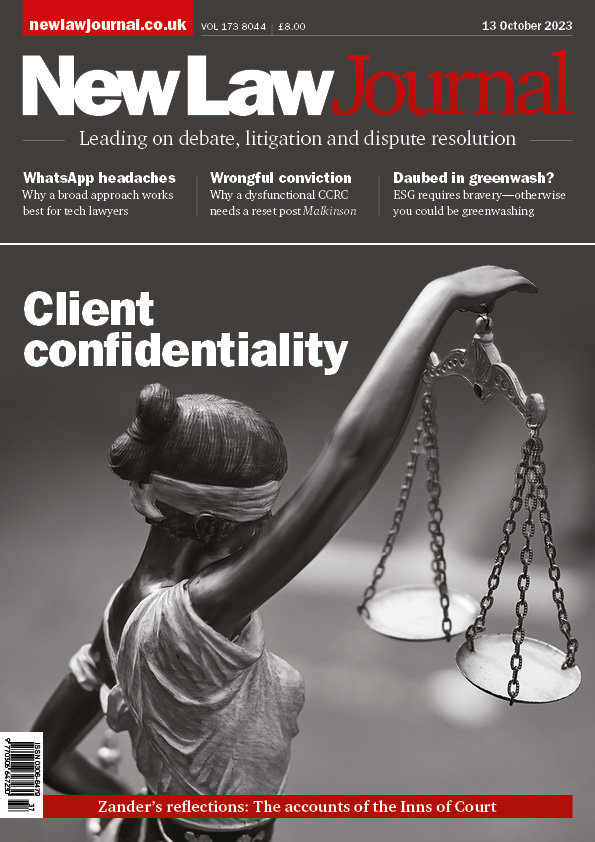THIS ISSUE

The Morgan Stanley fine shows why good tech lawyers take a broad approach, explains Paul Schwartfeger
Lucy Keane assesses the damage after Paccar Inc v CAT drove a juggernaut through the UK litigation funding industry
In a second update on financial settlements, David Burrows focuses on couples’ agreements & issues a plea for change
Colin Hulme, Head of IP at Burness Paull, considers the impact of ESG programmes on the observance of copyright by corporates
Michael Zander on why barristers have the legal right to ask to see the accounts
Bravery is the key to ensuring you don’t end up daubed in greenwash, says Andrew Magowan
Iain Miller & Charlotte Judd mull some tough ethical dilemmas
In the EAT, as in life, the pendulum may ‘swing’ one way or the other, and then later swing back. Ian Smith explains all in this month’s update
Andrew Malkinson’s exoneration highlights why a dysfunctional CCRC needs a reset, says Jon Robins
MOVERS & SHAKERS

Jackson Lees Group—Jannina Barker, Laura Beattie & Catherine McCrindle
Firm promotes senior associate and team leader as wills, trusts and probate team expands

Asserson—Michael Francos-Downs
Manchester real estate finance practice welcomes legal director

McCarthy Denning—Harvey Knight & Martin Sandler
Financial services and regulatory offering boosted by partner hires
NEWS
Holiday lets may promise easy returns, but restrictive covenants can swiftly scupper plans. Writing in NLJ this week, Andrew Francis of Serle Court recounts how covenants limiting use to a ‘private dwelling house’ or ‘private residence’ have repeatedly defeated short-term letting schemes
Artificial intelligence (AI) is already embedded in the civil courts, but regulation lags behind practice. Writing in NLJ this week, Ben Roe of Baker McKenzie charts a landscape where AI assists with transcription, case management and document handling, yet raises acute concerns over evidence, advocacy and even judgment-writing
The Supreme Court has drawn a firm line under branding creativity in regulated markets. In Dairy UK Ltd v Oatly AB, it ruled that Oatly’s ‘post-milk generation’ trade mark unlawfully deployed a protected dairy designation. In NLJ this week, Asima Rana of DWF explains that the court prioritised ‘regulatory clarity over creative branding choices’, holding that ‘designation’ extends beyond product names to marketing slogans
From cat fouling to Part 36 brinkmanship, the latest 'Civil way' round-up is a reminder that procedural skirmishes can have sharp teeth. NLJ columnist Stephen Gold ranges across recent decisions with his customary wit
Digital loot may feel like property, but civil law is not always convinced. In NLJ this week, Paul Schwartfeger of 36 Stone and Nadia Latti of CMS examine fraud involving platform-controlled digital assets, from ‘account takeover and asset stripping’ to ‘value laundering’







